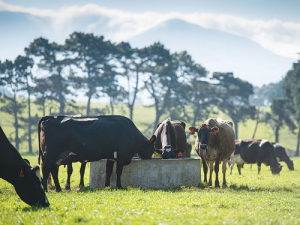Green no more?
OPINION: Your old mate has long dismissed the Greens as wooden bicycle enthusiasts with their heads in the clouds, but it looks like the ‘new Greens’ may actually be hard-nosed pragmatists when it comes to following voters.
 Beef + Lamb NZ, DairyNZ, Deer Industry NZ and Federated Farmers have all condemned the 2050 methane target as being far too draconian.
Beef + Lamb NZ, DairyNZ, Deer Industry NZ and Federated Farmers have all condemned the 2050 methane target as being far too draconian.
OPINION: The proposed livestock methane target reduction looks like a case of the Government killing the golden goose – or more correctly the cow, sheep and deer – of the NZ economy.
Targets proposed for cuts to methane in the Government’s Zero Carbon Bill have left the agricultural sector aghast at just exactly how it will meet these targets without the necessary technologies or major culls to livestock numbers.
The bill, backed by Labour, NZ First and the Greens, is due to go before a select committee in June and proposes reducing methane by 10% from 2017 levels by 2030 and 24-47% by 2050.
Farm sector leaders say achieving this goal would only be possible if science were able to deliver methane-shrinking technologies such as inhibitors for cows and sheep. However, these are not yet available.
Beef + Lamb NZ, DairyNZ, Deer Industry NZ and Federated Farmers have all condemned the 2050 methane target as being far too draconian. They say that without the necessary methane reducing technologies farmers and the NZ economy will suffer grave economic consequences.
Farming groups are arguing that the sector should not be required to reduce its current contribution to warming because carbon emitters in transport and other sectors are not being asked to do that. BLNZ says being asked to do that isn’t fair. It insists the goal for all gases should be “no additional warming”.
BLNZ spokesman Jeremy Baker points out that if methane inhibitors were to arrive on the scene the organisation would be happy for the 2050 target to be revised upwards. “At moment the only option is to reduce livestock numbers.”
The Government’s methane targets appear to be drawn from a range of calculations in an IPCC report that said countries must cut methane by 35% by 2050. Climate scientists generally agree that methane does not need to fall to zero or even close to zero to reduce warming.
Farmers will also not have the option of offsetting methane via carbon sequestration, ie planting trees, which other industries will have in reducing their emissions. As BLNZ argues, it’s unfair to ask farmers to help reduce their warming from methane unless getting to negative emissions by CO2 capture is also part of the picture.
The way the proposed livestock methane target reduction looks now it is very much a case of the Government killing the golden goose – or more correctly the cow, sheep and deer – of the NZ economy.
That would indeed be a pyrrhic victory for the Government and the country as a whole.
Donald Trump's latest tariff tantrum has again thrown the world of trade into a new round of turmoil and uncertainty, and NZ is caught up in it.
The third edition of the NZ Dairy Expo, held in mid-February in Matamata, has shown that the KISS principle (keep it simple stupid) was getting a positive response from exhibitors and visitors alike.
Twenty years ago, South African dairy farm manager Louis Vandenberg was sent to a farm in Waikato to provide training on Afimilk technology.
Strong farmgate milk price is helping boost investment on farms, says PGG Wrightson chief executive Stephen Guerin.
Fonterra's 460 milk suppliers in Australia, who will switch to Lactalis end of this month, are unfazed with the impending change.
The 5+ A Day Charitable Trust has launched a collection of affordable recipes designed to turn everyday vegetables into seasonal stars.

OPINION: A mate of yours truly reckons rural Manawatu families are the latest to suffer under what he calls the…
OPINION: If old Winston Peters thinks building trade relations with new nations, such as India, isn't a necessary investment in…